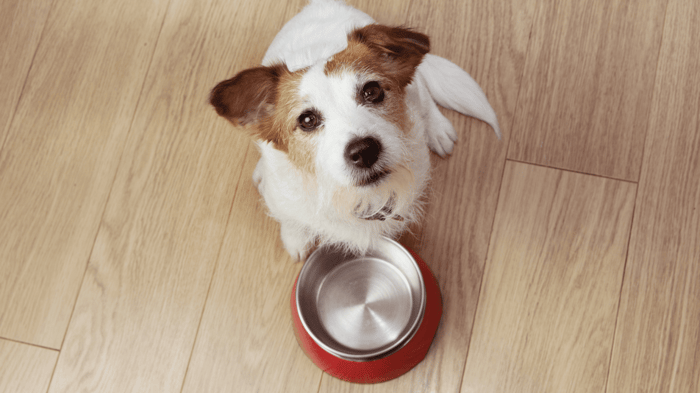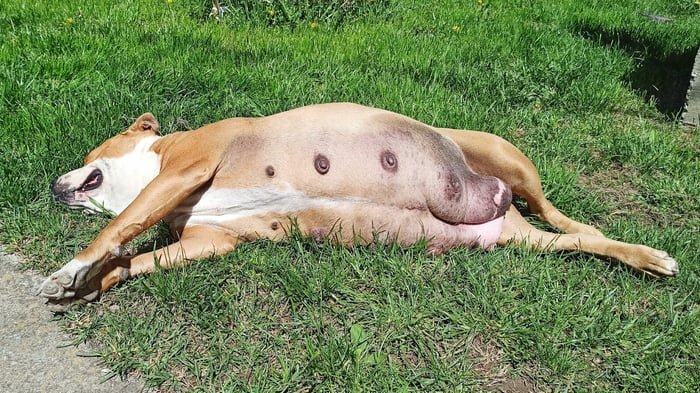Dogs are known for their love of food, and it’s not uncommon for them to beg for scraps or act as if they’re hungry all the time. However, if your dog is constantly acting hungry even after being fed, it could be a sign of an underlying issue.
The question “why is my dog hungry all the time” seems like a simple one, but truthfully, excessive hunger, called polyphagia, is an extremely complex issue. It could be a learned behavior, due to genetics, or a serious health issue. In some cases, it can mean your dog has deficiency of some kind and needs canine multivitamin. It can also mean your dog has issues absorbing nutrients, and needs doggy probiotics for better gut health.
Just like when dogs lose their appetites, excessive hunger can be a serious issue. So, we’re going to break down all the behavioral, genetic, hormonal, or metabolic issues that cause your dog to want to eat all the time.
So, Why Does My Dog Act Hungry All The Time?
Dogs can act hungry all the time because of learned behavior, compulsive eating due to boredom or stress, genetic factors, growth spurts, active lifestyles and fast metabolisms, or nutrient deficiencies. Extreme hunger (polyphagia) is also caused by medical issues like Cushing’s disease, diabetes, EPI, parasites, hyperthyroidism, or medications.
As you can see, the reasons for excessive hunger or polyphagia in dogs is pretty extensive. So let’s break it down and go through the different causes and what to look out for.
16 Reasons Dogs Act Hungry All The Time
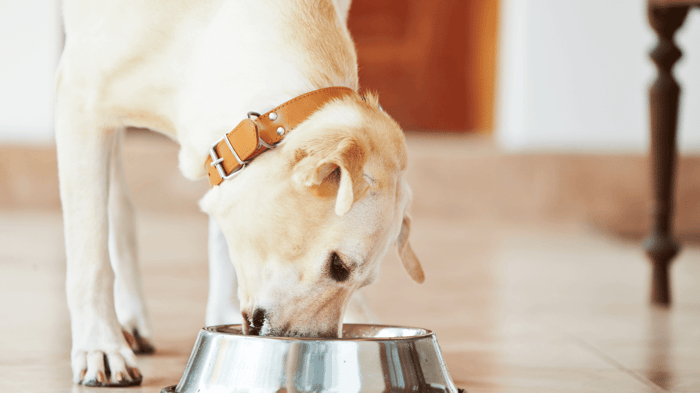
1. Learned & Reinforced Behavior
Dogs are intelligent animals and can learn to associate certain behaviors with rewards. Owners who regularly reward begging with high-value treats can inadvertently reinforce this behavior, leading to a dog constantly acting hungry. Similarly, dogs who regularly find something to eat in the trash will continue to dig in the trash, as this behavior has been reinforced by the reward of finding food.
Overfeeding of free feeding dogs can also contribute to learned and reinforced behavior. If a dog is given more food than it needs, it may become used to feeling full and expect that feeling all the time. This can lead to a dog acting hungry even when it has had enough to eat.
It is important for owners to be aware of the behaviors they are reinforcing in their dogs and to avoid rewarding unwanted behaviors. Instead, they should focus on rewarding positive behaviors, such as sitting quietly or lying down, with treats or praise.
2. Genetics
Some dog breeds are bred specifically to have a high food drive, which means they are always hungry and willing to work for food rewards. This trait can make them easier to train than other dogs. For example, the Labrador and Labrador mixes like the Mastador, are known for its high food drive and willingness to work for food. This high food drive makes dogs very easy to train.
The genetic reasons that some breeds are hungrier than others can differ from dog to dog.
Studies show in some breeds like Labradors or the Flat-Coat Retriever (FCR), a deletion in the Canine POMC Gene is associated with weight and appetite. This “deleted” gene disrupts the β-MSH and β-endorphin coding sequences. This means the dogs feel hungry all the time because they have lost the signal to their brain that makes them feel full. A study published in the Journal of Veterinary Internal Medicine found that Labradors with this deletion had a higher risk of being overweight or obese than those without it.
Other studies have shown that some dogs have lower levels of serotonin or dopamine in their brains, which can also lead to increased appetite. Eating food can be a way for these dogs to try to increase their serotonin levels, just like depressed or anxious humans may eat certain foods (like carbs) to help boost their serotonin levels.
Related Posts:
3. Diabetes
If a dog is acting hungry all the time, it could be a symptom of diabetes. Diabetes is a disease that affects the way the body uses glucose, which is the main source of energy for the body’s cells. When a dog has diabetes, their body is unable to produce enough insulin or use it properly, which leads to high blood sugar levels.
Some symptoms of diabetes in dogs include increased thirst and urination, weight loss, and increased appetite. Dogs with diabetes may also have a sweet-smelling breath or develop cataracts.
There are different types of diabetes in dogs, but the most common is Type 1 diabetes, which is caused by a lack of insulin production. Type 2 diabetes, which is caused by insulin resistance, is less common in dogs.
Treatment for diabetes in dogs typically involves insulin therapy, dietary changes, and regular monitoring of blood sugar levels.
4. Growth Spurts & Growing Puppies
Growing puppies often experience growth spurts, which can cause them to act hungry all the time. During these spurts, puppies need more food to fuel their growth and development. It’s important to provide them with a balanced and nutritious diet to support their growth.
However, research shows it’s crucial not to overfeed puppies, especially large or giant breed puppies. Overfeeding can lead to their bones growing too fast, which can increase the risk of disorders like hip dysplasia and even dislocated hips later in life. It also puts extra strain on their joints, which can cause wear and tear.
To ensure that your puppy is getting the right amount of food, it’s best to follow the feeding guidelines provided by your veterinarian or the puppy food manufacturer. These guidelines take into account your puppy’s age, weight, and activity level.
However, it’s important to feed your dog based on their condition more than what it says on the label. Dogs’s metabolisms can differ, so the amount of food they get needs differs from dog to dog. Essentially, if your dog is getting too skinny, they need more food. If they are getting pudgy, they need less.
As your puppy grows, their nutritional needs will change. It’s important to monitor their weight and adjust their food intake accordingly.
5. Exocrine Pancreatic Insufficiency (EPI)
Exocrine Pancreatic Insufficiency (EPI) is a condition where the pancreas is unable to produce enough digestive enzymes. This results in malabsorption of nutrients, leading to weight loss and increased appetite in dogs. EPI can be caused by various factors, including chronic pancreatitis, pancreatic cancer, or congenital defects.
Symptoms of EPI include:
- Frequent diarrhea;
- Weight loss;
- Increased appetite; and
- A dull coat.
If left untreated, EPI can lead to severe malnutrition, which can be life-threatening for dogs.
Treatment for EPI involves enzyme replacement therapy, where the dog is given pancreatic enzyme supplements with every meal. A low-fat, high-fiber diet may also be recommended to aid in digestion and prevent further damage to the pancreas.
6. Malnutrition Or Poor Quality Food
If a dog is not getting enough nutrients in their diet or they are eating poor quality dog food, it can show up as them being hungry all the time. This is because their body is not getting the essential nutrients it needs, so it sends signals to the brain that it needs more food.
One common reason for malnutrition in dogs is feeding them a diet that is not balanced. This could be a homemade diet that is not properly formulated or a commercial dog food that is not providing all the necessary nutrients. It is important to choose a high-quality dog food that is specifically formulated for the dog’s life stage and breed size and any health issues they may have.
A little understood issue in nutrition is that some nutrients can affect how other nutrients are absorbed. Some nutrients in food can cause deficiencies in others. For example:
- High fiber diets can interfere with the absorption of essential nutrients.
- Too much phosphorus can bind with calcium and interfere with calcium absorption.
- Too much calcium can bind with zinc or iron and create deficiencies with those minerals (not to mention kidney stones).
This is why the word “balanced” is so essential when we talk about nutrition for dogs.
Another reason for malnutrition is feeding a dog too little food. Dogs have different caloric requirements based on their size, age, and activity level. Feeding too little food can lead to malnutrition and hunger.
It is also possible that a dog is eating enough food, but the food is of poor quality. Some dog foods contain fillers and low-quality ingredients that are not easily digested by the dog’s body. This can lead to malnutrition and hunger, even if the dog is eating enough food. This is like eating Macdonald’s every day. You may be getting enough calories, but not enough nutrients to keep your body satisfied.
7. Obesity
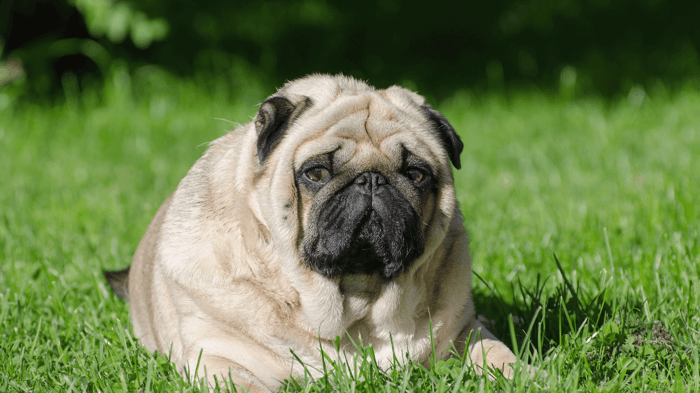
It sounds odd, but being overweight or obese can cause dogs to act and feel hungry all the time. Obesity causes a mechanism called “paradoxical hyperphagia,” where dogs that are overweight can keep feeling hungry even after eating a big meal. This can lead to excessive eating and weight gain.
Research has shown that certain antibodies in the blood of obese dogs recognize ghrelin, the hunger hormone, and regulate appetite. By binding to ghrelin, the immunoglobulins (proteins the body uses to fight germs) protect the hormone from being broken down rapidly in the bloodstream. This makes the ghrelin stay intact and keep telling the brain the dog is hungry, even when they are not.
It is estimated that about 56% of dogs in the US are overweight, making obesity a significant health concern for pets. It’s essential to monitor a dog’s weight and feeding habits, remembering to factor in treats like pig ears into their daily caloric intake.
8. Psychogenic Polyphagia (Compulsive Overeating Related to Boredom or Stress)
Just like humans, dogs can also develop an eating disorder called Psychogenic Polyphagia. This disorder is characterized by compulsive overeating related to boredom or stress and it is one of several eating and drinking behavior problems in dogs. When dogs feel bored or stressed, they may turn to food for comfort. Eating releases feel-good hormones that soothe them, and they may learn to associate food with relief from negative emotions. This habit can quickly turn into a compulsion, leading to excessive eating even when they are not hungry.
Dogs that suffer from Psychogenic Polyphagia may display a range of symptoms, including excessive hunger, weight gain, and even obesity. They may also exhibit behaviors such as begging for food, stealing food, or raiding the trash. If these dogs get given food freely, they massively overeat during the day.
These symptoms can be alarming for pet owners, but with proper treatment, dogs can recover from this disorder.
Treatment for Psychogenic Polyphagia involves addressing the underlying causes of the disorder. In many cases, this means providing dogs with more stimulation and attention to alleviate boredom and stress. Exercise, playtime, and socialization can all be effective in reducing stress levels in dogs. In severe cases, medication or behavior modification therapy may be necessary to help dogs overcome their compulsive eating habits.
9. Past Starvation
Dogs who have experienced starvation in the past may act hungry all the time, even if they are getting enough food. This behavior is a survival trait that they have learned to stock up on calories for the lean times. Dogs who have been homeless, abandoned, or feral have to scavenge for food, which means they have to eat as much as possible whenever they can.
This can sometimes also happen when puppies in litters are very competitive over feed, sometimes leading dogs become aggressive over food. You can read more in our article on littermate syndrome.
It’s also possible that dogs who have experienced neglect or abuse may act hungry all the time. These dogs may have been deprived of food in the past, which has led to their behavior. In some cases, these dogs may have a medical condition that makes them feel hungry all the time.
If your dog is acting hungry all the time, it’s important to rule out any medical conditions that may be causing the behavior. You should also make sure that your dog is getting enough food and is not being underfed.
Related Posts:
- Why Does My Dog Hide His Treats: Things You Should Know
10. Pregnancy & Lactation
During pregnancy and lactation, a dog’s energy and nutrient requirements increase significantly to support the growth and development of her puppies. As a result, it is not uncommon for a pregnant or nursing dog to act hungry all the time.
To meet the increased energy demands, diets containing approximately 4200 kcal ME/kg of dry matter are typical for a nursing dog or a dog that is in the final two or three weeks of pregnancy. It is important to note that the energy needs of a pregnant or nursing dog can vary depending on factors such as the size of the litter and the dog’s individual metabolism.
It is also important to ensure that pregnant and nursing dogs receive adequate amounts of protein, fat, and other essential nutrients. It’s vital that pregnant and nursing dogs get a carefully balanced diet. Do not feed her any supplements or treats may create an imbalance in her diet, as it can be dangerous to her.
Related Posts:
- Can a Dog Have an Abortion? Understanding the Options Available
- Food Intake and Nutrition During Pregnancy, Lactation and Weaning in the Dam and Offspring
- What to Expect from a Female Dog After Mating: A Complete Guide
11. Cushing’s Disease
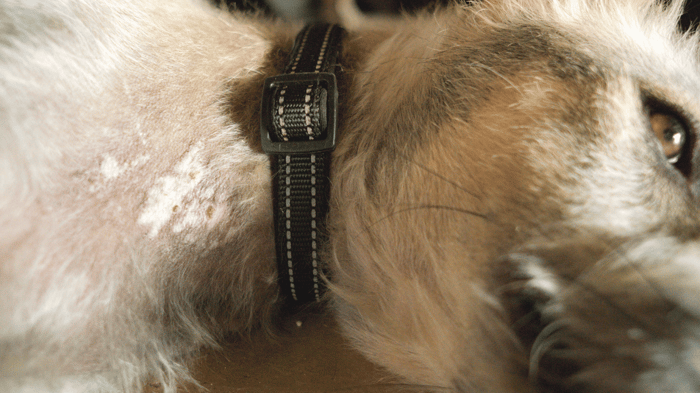
Cushing’s disease, also known as hyperadrenocorticism, is a hormonal disorder that occurs when the adrenal glands overproduce cortisol. This disease is more common in middle-aged and older dogs and can cause a range of symptoms, including increased appetite, thirst, and urination, as well as lethargy, hair loss, and muscle weakness.
One of the most common symptoms of Cushing’s disease is an increased appetite. Dogs with this condition may act hungry all the time, even if they have just eaten. This is because cortisol, the hormone that is overproduced in Cushing’s disease, can stimulate the appetite and cause the dog to feel hungry even when they are not.
Other symptoms of Cushing’s disease include increased thirst and urination, lethargy, hair loss, and muscle weakness. If you suspect that your dog may have Cushing’s disease, it is important to take them to the vet for a proper diagnosis and treatment.
Treatment for Cushing’s disease may include medication, surgery, or a combination of both. FDA-approved medications can help manage the disease, while surgery may be necessary in some cases to remove the affected adrenal gland. Your vet will be able to recommend the best course of treatment for your dog based on their individual needs.
12. Malabsorption Syndrome
Malabsorption syndrome is a condition that affects a dog’s ability to absorb nutrients from their food. It occurs when there is damage or dysfunction in the small intestine, which is responsible for absorbing nutrients. Malabsorption syndrome can be caused by a variety of factors, including parasites, infections, inflammatory bowel disease, and pancreatic insufficiency.
Dogs with malabsorption syndrome may appear hungry all the time because they are not getting the nutrients they need from their food. They may also experience weight loss, diarrhea, and a dull coat. Treatment for malabsorption syndrome depends on the underlying cause and may include medication, dietary changes, and supportive care.
It is important to note that malabsorption syndrome can be a serious condition and should be diagnosed and treated by a veterinarian.
13. Parasites
Parasites are another possible cause of a dog acting hungry all the time. Parasites such as hookworms, tapeworms, and roundworms can cause a dog to feel constantly hungry because the parasites are consuming the nutrients from the food the dog eats. This can lead to weight loss, lethargy, and a dull coat in addition to increased hunger.
To determine if parasites are the cause of a dog’s constant hunger, a veterinarian can perform a fecal exam to check for the presence of parasites. If parasites are found, the vet will prescribe medication to eliminate them.
It’s important to note that some parasites can be transmitted to humans, so it’s crucial to keep your dog parasite-free not only for their health but for your own as well.
Related Posts:
- Do Bed Bugs Bite Dogs? A Quick Guide to Protecting Your Furry Friend
- How to Tell If Your Dog Has Fleas: Signs and Symptoms
14. Metabolic Changes in Spayed and Castrated Dogs
Neutering and spaying dogs can cause hormonal changes that affect their metabolism, leading to weight gain and an increased appetite. A study conducted in Denmark found that neutered male dogs were at a higher risk of obesity than intact males, while spayed females did not have a significantly increased risk of obesity compared to intact females. This suggests that neutering may have a greater impact on metabolism in male dogs than in females.
However, many pet parents with spayed female dogs feel their dogs do seem to have tendency to gain weight, especially as they grow older.
In addition to hormonal changes, spaying and neutering can also cause a decrease in energy expenditure, which can contribute to weight gain. This decrease in energy expenditure is thought to be due to a decrease in physical activity and a decrease in resting metabolic rate.
If your dog has been spayed or neutered and is showing signs of increased hunger or weight gain, it may be helpful to adjust their diet and exercise routine accordingly. Feeding smaller, more frequent meals and increasing exercise can help to maintain a healthy weight and prevent obesity.
Related Posts:
15. Certain Medications
Certain medications can cause dogs to act hungry all the time. Thyroid medications, Prednisone, and seizure medications are known to increase a dog’s appetite. These medications can affect the hormones and chemicals in a dog’s body that regulate hunger and satiety.
Thyroid medications are commonly prescribed to dogs with hypothyroidism, a condition in which the thyroid gland does not produce enough thyroid hormone. These medications can increase a dog’s metabolism, which can lead to increased hunger and weight gain.
Prednisone is a steroid medication that is often prescribed to dogs with allergies, autoimmune diseases, and other inflammatory conditions. It can cause an increase in appetite, as well as weight gain, due to its effect on the body’s metabolism.
Seizure medications, such as phenobarbital, can also cause increased hunger in dogs. These medications work by changing the levels of certain chemicals in the brain, which can affect a dog’s appetite.
If a dog is taking any of these medications and is acting hungry all the time, it is important to talk to a veterinarian. They may be able to adjust the dosage or switch to a different medication to help manage the dog’s appetite and weight.
16. Hyperthyroidism
Hyperthyroidism is a condition that occurs when the thyroid gland produces too much thyroid hormone. This can cause an increase in appetite and weight loss in dogs. The thyroid gland is located in the neck and produces hormones that regulate metabolism. When the gland produces too much hormone, it can cause the body to burn calories at a faster rate, leading to weight loss and an increase in appetite.
Hyperthyroidism is more commonly seen in cats, but it can also occur in dogs. It is most often seen in middle-aged and older dogs. Some breeds, such as the Doberman Pinscher, are more prone to developing the condition. And, research shows it can also happen if your dog eats the neck of an animal (usually in a homemade raw diet) that still contains the dead animal’s thyroid gland.
Symptoms of hyperthyroidism in dogs include increased appetite, weight loss, increased thirst and urination, restlessness, panting, and a rapid heart rate. In severe cases, dogs may also experience vomiting, diarrhea, and difficulty breathing.
Treatment for hyperthyroidism in dogs typically involves medication to regulate the thyroid hormone levels. In some cases, surgery may be necessary to remove part or all of the thyroid gland. A low-iodine diet may also be recommended to help manage the condition.
What are Some Signs and Symptoms that My Dog is Always Hungry?
Dogs are known for their love of food, but sometimes they can seem like they’re always hungry. If you’re wondering whether your dog is truly hungry or just begging for attention, there are a few signs and symptoms to look out for.
Increased Appetite
One of the most obvious signs that your dog is always hungry is an increased appetite. If your dog is constantly begging for food or trying to steal food from the table, it’s a good indication that they’re feeling hungry.
Weight Gain
If your dog is always hungry and eating more than usual, it’s likely that they will start to gain weight. This can be a problem if your dog is already overweight or obese, as it can lead to health issues such as joint problems, heart disease, and diabetes.
Begging Behavior
Dogs are masters at begging for food, and if your dog is always hungry, they may become even more persistent in their begging behavior. This can include whining, pawing, and jumping up on you or the table.
Digestive Issues
If your dog is always hungry, they may start to experience digestive issues such as vomiting, diarrhea, or constipation. This can be a sign that they’re eating too much or that their diet is not balanced.
Increased Thirst
Dogs that are always hungry may also start to drink more water than usual. This is because their body is trying to compensate for the increased food intake, and they need more water to digest their food.
Overall, if your dog is always hungry, it’s important to monitor their food intake and make sure they’re getting the right amount of nutrients. If you’re concerned about their appetite or weight, it’s always best to consult with your veterinarian.
Why is My Senior Dog Suddenly Hungry All the Time?
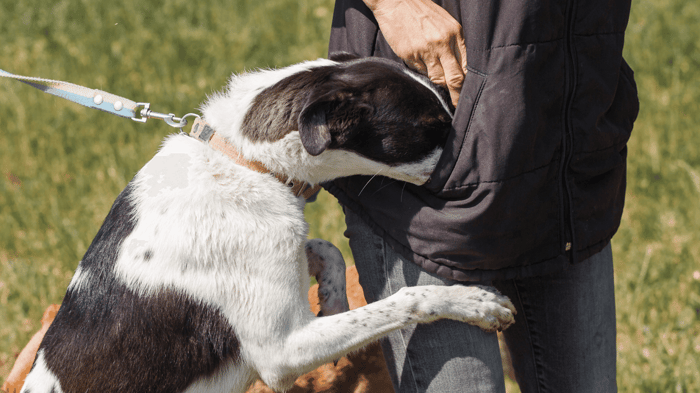
As dogs age, their metabolism slows down, and they become less active. This can lead to weight gain and an increased appetite. However, sudden changes in appetite can also be a sign of an underlying health issue. Here are the two most common reasons why a senior dog may suddenly act hungry all the time:
Diabetes
Diabetes is a common condition in senior dogs, and one of the symptoms is an increased appetite. Dogs with diabetes may also drink more water and urinate more frequently.
Cushing’s Disease
Cushing’s disease (or hyperadrenocorticism) is a condition caused by an overproduction of cortisol, a hormone produced by the adrenal glands. One of the symptoms of Cushing’s disease is an increased appetite, along with weight gain, lethargy, and increased thirst and urination.
If a senior dog suddenly appears hungry all the time, it is important to schedule a veterinary appointment to rule out any underlying health issues. A veterinarian can perform a physical exam and run diagnostic tests to determine the cause of the increased appetite and recommend an appropriate treatment plan.
How to Address Your Dog’s Hunger
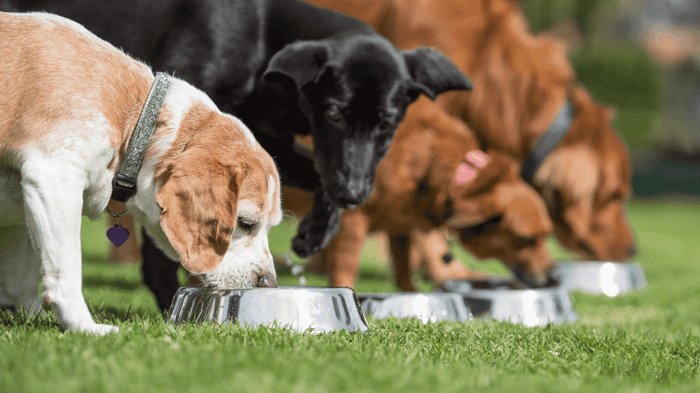
If your dog seems to be constantly hungry, there are several steps you can take to address this issue. The following are some ways to help your dog feel satisfied without overfeeding.
Veterinary Consultation & Deworming
First and foremost, it is important to consult with your veterinarian to rule out any underlying medical conditions that may be causing your dog’s increased appetite. Your vet can perform a physical exam and run some tests to determine if there are any health issues that need to be addressed.
A vet will also need to check your dog’s blood or urine for hormonal issues like diabetes or Cushing’s disease. It’s a good idea to check your dog for any deficiencies that could be causing excess hunger. Some dogs have trouble absorbing certain nutrients, or may not be getting enough in a specific diet.
Also, make sure your dog is dewormed and treated for any parasites.
Dietary Adjustments
If your vet determines that your dog is healthy, you can try adjusting their diet to help them feel more satisfied. Here are some steps to take:
- Consider switching to a high-quality, nutrient-dense dog food that is formulated to meet your dog’s specific nutritional needs. If your dog’s kidneys and liver is sound, opt for a diet of high-quality animal protein.
- Your dog should be getting healthy carbs in their diet, provided they don’t have allergies (however, most food allergies are to animal proteins). The benefit of commercial dog food is that it is convenient and typically has all the nutrients a dog needs balanced in their diet.
- You may also want to try feeding your dog smaller, more frequent meals throughout the day instead of one or two large meals.
- The slower your dog eats, the better, so use slow feeders and snuffle mats. This gives the dog a bit more time to receive the signal that they feel full.
- Make use of their high food drive to invest in training. No matter our dog’s age or breed, using part of their food to reward them for obedience training can make mealtimes a positive bonding experience and an opportunity to cultivate good behavior.
- In addition, you can try adding low-calorie, high-protein, high-fiber foods to your dog’s diet to help them feel fuller for longer periods of time. Keep in mind, some dogs have metabolic or other issues that affect their diet. For example, Dalmatians and Dalmatian mixes like the Dusky, can have a problem metabolizing the purines in red meat. Other dogs can have allergies to specific proteins, like chicken, beef, or soy.
Behavioral Training
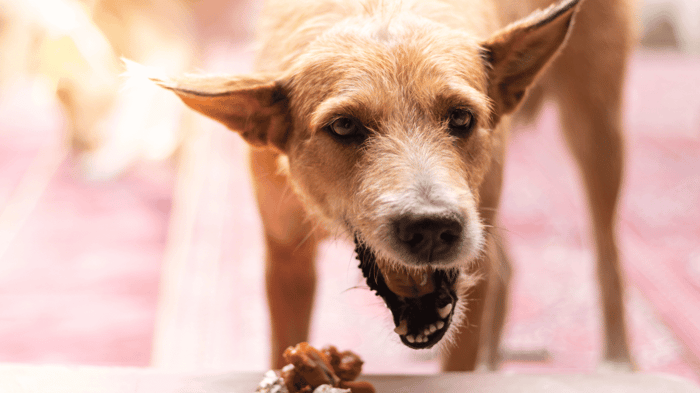
Finally, if your dog’s constant hunger seems to be more of a behavioral issue, you can work on training them to better understand when it is appropriate to ask for food. Here are some guidelines.
- Start by establishing a regular feeding schedule and only offer food during designated meal times. Avoid giving your dog table scraps or treats throughout the day, unless it’s food rewards as part of their training.
- You can also try using positive reinforcement training techniques to reward your dog for good behavior and discourage begging or demanding behavior. For example, you can give your dog a treat or praise them when they sit quietly while you prepare their food, and ignore them if they beg or whine.
- Place training is absolutely essential to eat in place, but you can also put your dog in their crate during meal times.
- Make sure your dog has no access to scraps or places they can scavenge for food.
- Make sure your dog has plenty of things to do that don’t involve food. Invest in play time, exercise, games and other positive activities to shift their focus away from food.
By taking these steps, you can help your dog feel more satisfied and reduce their constant hunger without overfeeding or causing any health issues.
When to Seek Professional Help
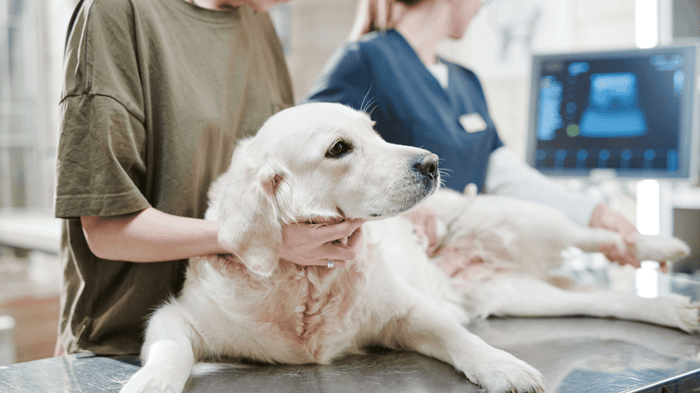
If a dog continues to act hungry all the time despite receiving sufficient food, water, and exercise, it may be time to seek professional help. Here are some signs that indicate it’s time to take your dog to the veterinarian:
- Rapid weight gain or loss;
- Frequent vomiting or diarrhea;
- Gains a pot belly;
- Has dull fur or loses hair;
- Increased thirst or urination;
- Lethargy or lack of energy; and
- Changes in behavior or temperament.
These symptoms could be indicative of an underlying medical issue such as diabetes, thyroid problems, or gastrointestinal problems. It’s essential to rule out any medical issues before attempting to address the problem with behavioral training or changes in diet.
The veterinarian may perform a physical examination, run tests, or suggest changes in diet or medication to address the issue. It’s crucial to follow the veterinarian’s advice and monitor your dog’s behavior and appetite closely.
In some cases, a dog may act hungry all the time due to psychological issues such as anxiety or boredom. In such cases, the veterinarian may suggest behavioral training or provide recommendations for toys or activities that can keep the dog engaged and stimulated.
Overall, if a dog continues to act hungry all the time despite receiving sufficient food, water, and exercise, it’s essential to seek professional help to identify and address any underlying medical or psychological issues.
Frequently Asked Questions (FAQs)
Why does my dog have an insatiable appetite?
What could be causing my dog’s increased appetite?
How can I help my dog feel full and satisfied?
Is it normal for an older dog to suddenly become hungrier?
What is the recommended feeding schedule for dogs?
Conclusion
In conclusion, there are several reasons why a dog may act hungry all the time. While some dogs may have a genetic predisposition to overeating, others may be suffering from underlying medical conditions that cause them to feel constantly hungry.
It’s important to ensure that your dog is receiving a nutritionally balanced diet that meets their daily caloric needs. Additionally, providing your dog with regular exercise and mental stimulation can help prevent boredom and overeating.
If you suspect that your dog’s constant hunger may be due to a medical condition, it’s important to consult with your veterinarian. They can help diagnose and treat any underlying health issues that may be contributing to your dog’s behavior.
Overall, understanding the reasons behind your dog’s constant hunger can help you provide them with the best care possible. By addressing any underlying health issues and providing a balanced diet and regular exercise, you can help ensure that your furry friend stays happy and healthy for years to come.


